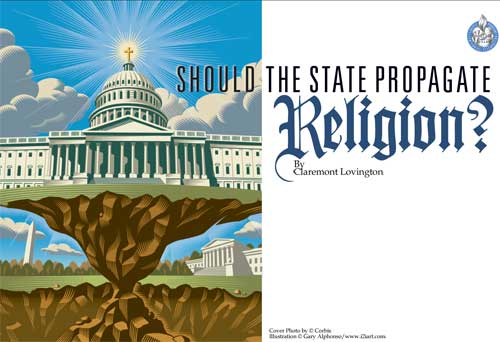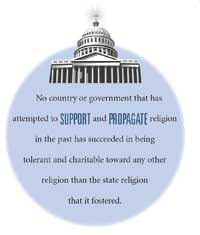Should the State Propagate Religion?
July/August 2005
Getting your Trinity Audio player ready...

Some people think that it is perfectly proper and wise to have the state support and propagate religion, if it is a good religion. But we believe that if it is a good religion, it is capable of propagating itself and needs no support from the state. If it is a bad religion, all but its adherents will admit that the state should not propagate or support it. A religion that is not capable of propagating and supporting itself on its own merits, and that has to appeal to the state for help, is a bad religion. Some very loose thinking is being done by many good people upon this subject. Some people think that everything that is "good" and "pure" should be supported and propagated by the civil government, and everything that is not "good" and not "pure" should be legislated against by the state. They fail to draw any distinction between things which are "civil" or "secular" and things that are "religious" or "spiritual." As a consequence, their thinking is muddled and confused.
Example of Confused Reasoning

The hierarchy further argued that "unsound and corrupt spiritual food constitutes a far greater menace and danger to society than adulterated and pernicious drink and food material." Then going a step further, the hierarchy of this church argued that "that state not only ought to prohibit the propagation of all unchristian and anti-Christian teachings condemned by the church, but ought to provide good spiritual food for all the people by making Christianity a part of the public education system, teaching the gospel in the state schools as approved and interpreted by the state church."
Such logic may seem sound to a church hierarchy that has succeeded in obtaining a predominant control over a state, so far as its own peculiar doctrines and interests are concerned; but let us suppose that a dissenting minority group should grow so rapidly as to gain the ascendancy and control over the state. Would the allegedly and assumed orthodox state church still hold that the newly acquired state church should control the state in matters affecting the prohibition of the doctrines that the new church-and-state regime might declare as "unchristian and anti-Christian"?
Just such strange things have happened when civil governments were in turn administered by Catholic and then by Protestant regimes. Each acknowledges the other as heterodox and itself as orthodox. Each suffered persecution at the hands of the other when clothed with civil authority. Each claimed that its own teachings were the teachings of Christ and true Christianity, and consigned the teachings of the other to the lower regions.
Liberty Impossible in Church-and-State Regime
There are two things that contribute to such an embarrassing situation. They are the doctrines of authoritarianism and totalitarianism. An authoritarian church and a totalitarian state always produce the above results. A church or a state that believes that it rules by divine right also believes that it has a right to rule in all things both temporal and spiritual. Such a doctrine always leads to a union of church and state and the persecution of all dissenters and nonconformists to state religion. Religious liberty is utterly impossible under a church-and-state regime. The failure to draw a line of demarcation between civil and religious matters, and between secular and spiritual functions, is the root cause of all religious persecution.
The United States of America has set an example to all the world and has demonstrated to all the world that the affairs of the state and the concerns of religion prosper far more and produce more benevolent results when both are separated and each acts independently in its own sphere, than when they are united and one dominates the other.
The state has a right to regulate pure-food laws because the state is ordained to defend and protect the bodies of human beings, whereas the church is ordained to work for the souls of human beings. The state has no authority over the souls or spiritual destiny of its citizens, but over their bodies only. The body is dependent for its well-being upon physical food, and the soul of humans is nourished with spiritual food. Since the church is commissioned to feed Christ's sheep, it is the duty of the church to hand spiritual food to the people. This commission was never delivered by Christ to Caesar or the state, but it was expressly given to His disciples-the church. Those who claim that the state, as well as the church, is to feed the flock of God spiritual food resort to fallacious arguments that have never yet produced practical results. Their reasoning is not only unsound, but selfish, arrogant, and intolerant in spirit as well as in practice.
State Religion Fosters Intolerance and Bigotry
No country or government that has attempted to support and propagate religion in the past has suc-ceeded in being tolerant and charitable toward any other religion than the state religion that it fostered. In every age and in every country a union of church and state has led to baneful consequences, and history makes no exception. Whenever civil force is em-ployed in the interests of religion, bigotry is un-ceasingly vigilant in its stratagems and connivances to secure for the state religion an exclusive ascendancy and dominance over the human mind and religious practices. The spirit of intolerance in religious leaders under a church-and-state union is ever ready to arm itself with all the instruments of terror of which the civil power is capable, to exterminate those who doubt its dogmas or resist the acceptance of its infallible pronouncements.
It makes little difference by what name a state religion operates; whether Catholic or Protestant, its means and methods of operation are the same. The Catholics and Protestants have alternately waged the most ferocious and unrelenting warfare on each other, whenever they were in the ascendancy and were armed with civil power. There is no need for the pot to call the kettle black when both are equally smeared.
We Protestants who have erred along these lines in the past are willing to confess our faults and acknowledge our mistakes. The Protestants of Geneva, Switzerland, erected a monument to Servetus, whom Calvin burned at the stake for his opinions, and humbly acknowledged the mistake and attributed it to the mistaken concept of state churchism. It is simply impossible to have religious liberty flourish where a state religion, which discriminates against all other religions, operates in a government.
Church Never Benefited by State Patronage
Not only are civil and religious liberty and equality impossible under the regime of a church-and-state union, but religious progress is impossible. Force in religion destroys true spirituality, tolerance, and charity. It can only engender bitterness and hatred on the part of the persecutor, and certainly it can never develop devotion and admiration for a state religion on the part of the persecuted.
But religious domination and oppression by means of the civil power never benefit the state church ultimately. Any church that receives legal sanction from the state for the dogmas it holds, and is given financial support from the state treasury for the maintenance of religious institutions and its workers, is in danger of incurring the disfavor of the state and of being administered and controlled by the state whenever disagreements arise between the church and the state, or whenever political upheavals occur in the course of human events. Quite recently the state churches have suffered very bitter and humiliating experiences as the result of having received financial support as well as legal sanction and aid in the enforcement of church dogmas and usages.

For centuries the Russian government had a state religion and gave it very substantial financial support in the building of its churches, cathedrals, and schools, paying the salaries of the clergy and religious teachers in religious schools. In fact, the state church enjoyed not only copious financial support, but legal sanction and enforcement of her church dogmas, and at times the head of the state church was the dominat-ing factor not only in the church but in state affairs.
Religious oppression was rampant in the land of Russia, and dissenters and nonconformists could not call their souls their own. The dungeon and exile were the rewards for free expression of religious opinions. Religious oppression and hardships breed contempt even among the adherents of a state re-ligion, and it fosters and foments hatred, especially among those who are unbelievers in religion. For many centuries the state church was able to suppress all opposition and maintain its control over state affairs as well as religious concerns, so as to prevent any evil consequences to the church interests. But a day of reckoning finally arrived, as it does in all countries where state churchism rules with an iron hand. The people bear up under oppression and restraint for a long time, but when it becomes un-bearable, then the people revolt, and woe to the op-pressors.
When the Russian revolt occurred, it turned its wrath upon its oppressors, and the heads of the church and the state both had to make a hasty exit, and those who failed to make the exit out of the country paid dearly for their failure. Religion itself was taboo, and the state church had all its property con-fiscated. The state religion suffered the loss of all the state ever gave in patronage for its support, and was left worse than stranded upon its own resources. The adherents of the state church had never cul-tivated the spirit of self-sacrifice, and as a conse-quence the church was unable to support itself.
Lessons Not Learned
One of the strangest anomalies in history is that those state churches which have suffered such bitter and humiliating experiences at the hands of the populace and the state as the result of too much meddling in politics and the use of force in religion do not seem to have learned any lessons from these devastating experiences of the past, and still insist on trying the same experiment over again. The lure of state power and state support seems to have an intoxicating effect upon all who indulge in such ex-periments.
If there is one lesson that history teaches with unerring accuracy, it is that no church or religion, no matter what its name, can afford to meddle with politics or receive state support, either legally or financially, without surrendering its spirituality, its freedom and independence, and finally suffering a bitterly humiliating experience as the reward for its own oppressive acts of intolerance and persecution for conscience' sake. The state should remain abso-lutely neutral in all religious concerns.
Reprinted from Liberty Magazine, Volume 37, Number 3, 1942.